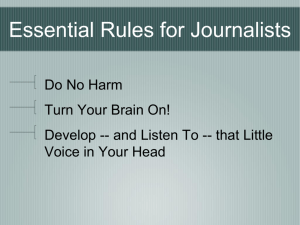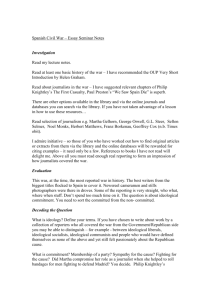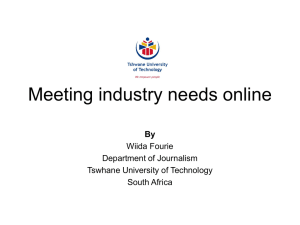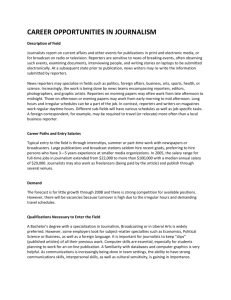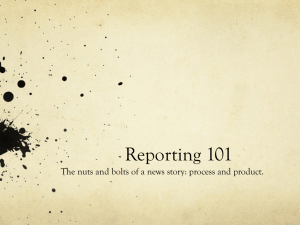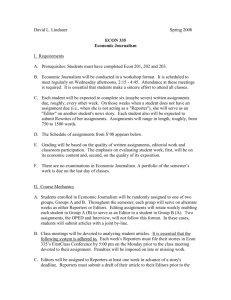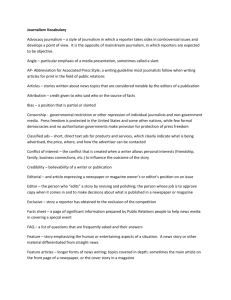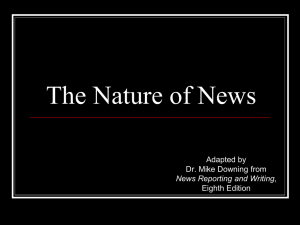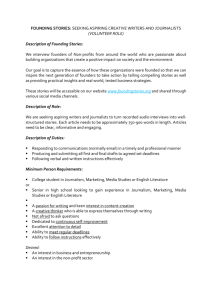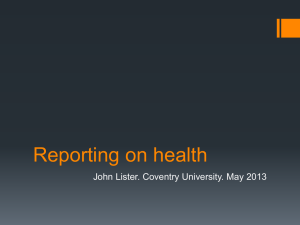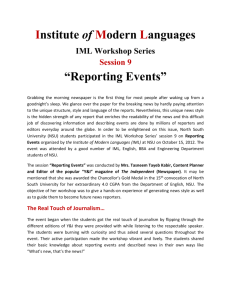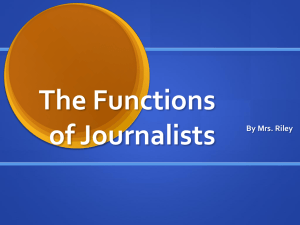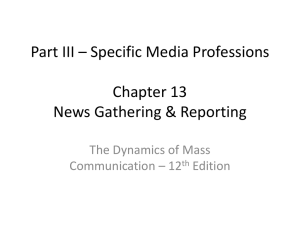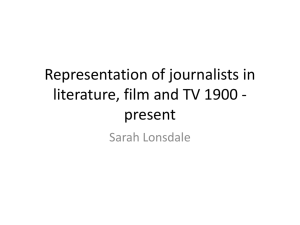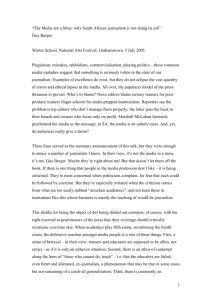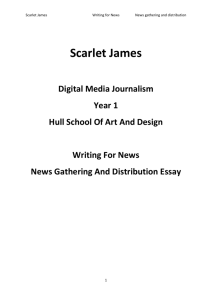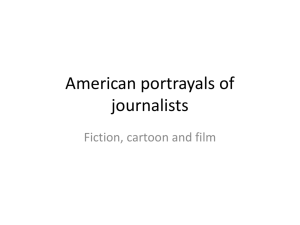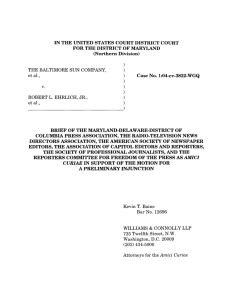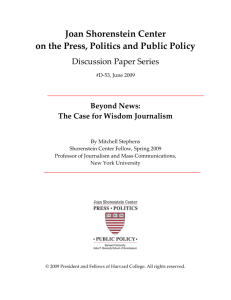Presentation by Richard Peppiatt
advertisement
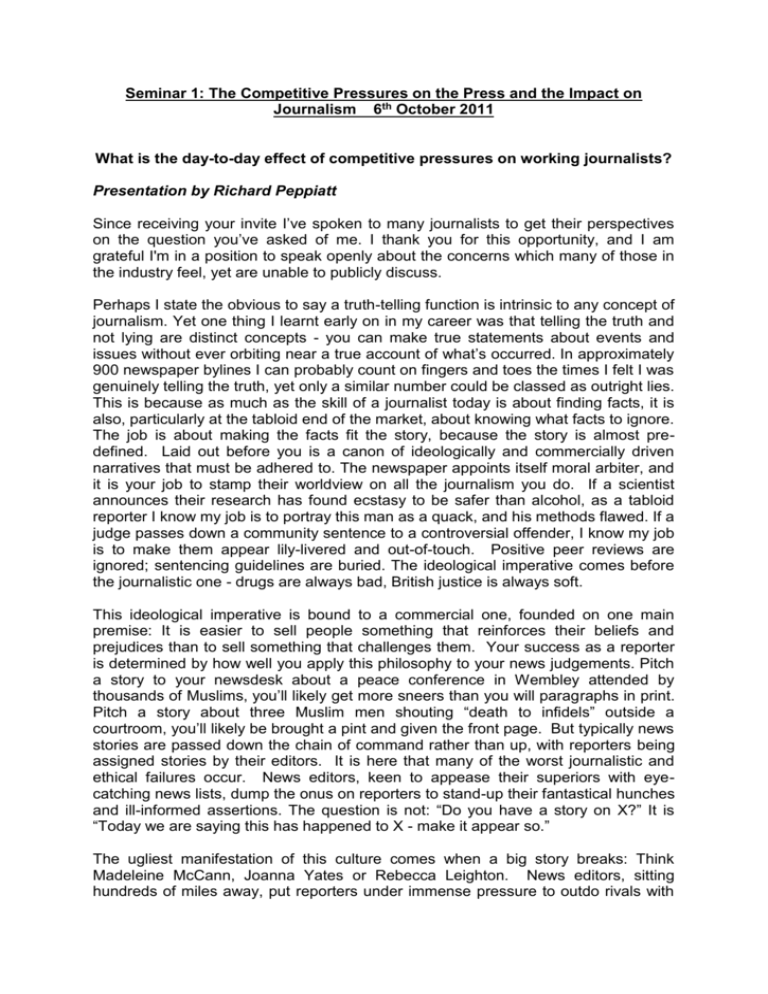
Seminar 1: The Competitive Pressures on the Press and the Impact on Journalism 6th October 2011 What is the day-to-day effect of competitive pressures on working journalists? Presentation by Richard Peppiatt Since receiving your invite I’ve spoken to many journalists to get their perspectives on the question you’ve asked of me. I thank you for this opportunity, and I am grateful I'm in a position to speak openly about the concerns which many of those in the industry feel, yet are unable to publicly discuss. Perhaps I state the obvious to say a truth-telling function is intrinsic to any concept of journalism. Yet one thing I learnt early on in my career was that telling the truth and not lying are distinct concepts - you can make true statements about events and issues without ever orbiting near a true account of what’s occurred. In approximately 900 newspaper bylines I can probably count on fingers and toes the times I felt I was genuinely telling the truth, yet only a similar number could be classed as outright lies. This is because as much as the skill of a journalist today is about finding facts, it is also, particularly at the tabloid end of the market, about knowing what facts to ignore. The job is about making the facts fit the story, because the story is almost predefined. Laid out before you is a canon of ideologically and commercially driven narratives that must be adhered to. The newspaper appoints itself moral arbiter, and it is your job to stamp their worldview on all the journalism you do. If a scientist announces their research has found ecstasy to be safer than alcohol, as a tabloid reporter I know my job is to portray this man as a quack, and his methods flawed. If a judge passes down a community sentence to a controversial offender, I know my job is to make them appear lily-livered and out-of-touch. Positive peer reviews are ignored; sentencing guidelines are buried. The ideological imperative comes before the journalistic one - drugs are always bad, British justice is always soft. This ideological imperative is bound to a commercial one, founded on one main premise: It is easier to sell people something that reinforces their beliefs and prejudices than to sell something that challenges them. Your success as a reporter is determined by how well you apply this philosophy to your news judgements. Pitch a story to your newsdesk about a peace conference in Wembley attended by thousands of Muslims, you’ll likely get more sneers than you will paragraphs in print. Pitch a story about three Muslim men shouting “death to infidels” outside a courtroom, you’ll likely be brought a pint and given the front page. But typically news stories are passed down the chain of command rather than up, with reporters being assigned stories by their editors. It is here that many of the worst journalistic and ethical failures occur. News editors, keen to appease their superiors with eyecatching news lists, dump the onus on reporters to stand-up their fantastical hunches and ill-informed assertions. The question is not: “Do you have a story on X?” It is “Today we are saying this has happened to X - make it appear so.” The ugliest manifestation of this culture comes when a big story breaks: Think Madeleine McCann, Joanna Yates or Rebecca Leighton. News editors, sitting hundreds of miles away, put reporters under immense pressure to outdo rivals with sales-boosting exclusives. They whip-up a feeding frenzy atmosphere around crimes in which any information, however unverified, becomes fervently seized on, in which victims families are hounded day and night for quotes, and in which suspects become tried in newsprint before they’ve even stepped foot in a police interview room. If the PCC claim they have reigned in many of these excesses, they must have been watching over the wrong Fleet Street. If editors really had no idea that the lifewrecking stories about the likes of Robert Murat and Chris Jefferies they printed were grossly defamatory then reporters' heads would roll. They don't because there exists an unspoken contract between tabloid newspaper and reporter; you tell us what we want to hear, and we won’t enquire too much of veracity or methods. If there’s any come back, we’ll protect you. It is a code of omerta, and if you want to get on, you abide by it. This is where the PCC has not only failed the public, but journalists too. The majority of reporters aren’t comfortable with constantly walking the conceptual tightrope between telling the truth and lying, and certainly not with breaking the law. But when the PCC won’t even enforce the first section of their code - “The press must take care not to publish inaccurate, misleading or distorted information” – is it any surprise that newspapers push the boundaries, hacking phones, bribing police, pursuing their own commercial and ideological aims under the cloak of journalism, with reporters used as the foot soldiers? Newspapers are in decline, and the job pool for journalists ever shrinking. Those entering the industry can spend years working on a casual basis, lacking the security of an employment contract. Tabloid newsrooms are often bullying and aggressive environments, in which dissent is simply not tolerated. It is difficult to stand up and walk out the door with a mortgage to pay, knowing another opportunity is unlikely to be waiting beyond. I am not attempting to absolve myself, or others, of personal responsibility for our actions, only to contextualise them. Journalists aren’t, for the most part, bad people. But, like all humans, they adjust to their environment, and, like in all competitive industries, those who adjust best, go furthest. Do it long enough you’ll even start to forget that the framework in which you operate is intrinsically corrupted and dishonest. There is no better example of the current cynical approach to journalism than my former employer the Daily Star, and their sister Express titles. Few would disagree that beneath their masthead has occurred some of the worst journalism of recent years. The xenophobia, the misleading front pages and endemic cross-promotion have set a new low bar for the industry, with papers such as the Daily Mail increasingly stooping to join them. The Daily Star does not have the worst journalists, but Richard Desmond’s chronic under-investment in journalism has allowed a corrosive culture to fester. I remember one shift there being just myself and two other reporters to write the whole of a national newspaper. It was so bad we had to use pseudonyms to make it appear there were more of us. In such an environment, proper journalistic rigor is impossible. News priorities are being warped to keep pace with the changing media landscape, and this is radically transforming the required skill sets of the trade. Instead of being balanced, the demand is to be partial and provocative. Instead of being accurate, the demand is to be first. Earlier this week the Daily Mail publishing reaction from the Amanda Knox trial which included quotes from prosecutors and courtroom colour after her appeal was rejected. Except, of course, her appeal was granted. In desperation to be first off the grid they'd simply made it up. This was not showbiz gossip - this was a murder case. Nor was this the behaviour of a rogue reporter, but a decision taken by news executives. Instead of publishing journalism, they knowingly chose to publish fiction. Capitalism is trampling on journalism. Cold calculation are made: It makes no commercial sense to have your reporters spend a week investigating a genuine, public interest story when they can fill ten times that space cannibalising from rivals and newswires. It makes no commercial sense to have your reporters writing about someone else’s products, or TV shows, when you can get free advertising from them writing about your own. It makes no commercial sense not to use your journalists to dig up dirt on people you don’t like, and to promote the people you do. But the people caught in the crossfire of this cynical approach are the millions of readers who buy tabloid newspapers every day in good faith, unaware of the commercial and ideological agendas which are shaping what they read. Instead of being told the truth they deserve, they are being told whatever it suits newspapers to let them know. As much as I resigned from the Daily Star because I’d come to believe it was Islamophobic, my conscience was troubled by another, even more sinister, realisation; their hate mongering wasn’t genuine. It was a crude, morally deplorable play on the politics of fear in the pursuit of profit. They may be the worst offenders, but they are far from alone. Beyond the headline grabbing revelations of phone hacking, this is the ethical rot that I urge you to consider Lord Leveson, because it undermines real journalism, it perverts social debate, it divides communities. It makes victims of The Many, by exploiting both public and journalist, to line the pockets of The Few.
